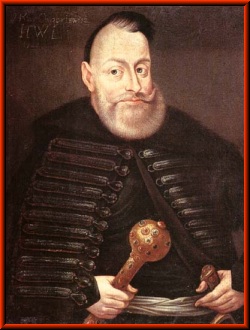
Born: 1560, Wilno, Polish-Lithuanian Commonwealth (presently Vilnius, Lithuania)
Died: September 24, 1621, Chocim, Polish-Lithuanian Commonwealth (presently Khotyn, Ukraine)
Early days. His father was Jan Hieronim Chodkiewicz, castellan of Wilno (now Vilnius, Lithuania), mother - Krystyna Zborowska.
Higher education.Fighting abroad.After being educated at Wilno academy he went abroad to learn the science of war (Ingolstadt, Germany and Padova, Italy), fighting in the Spanish service under Duke d’Alva, governor of the Netherlands and also under Maurice of Nassau, Prince of Orange, Stadtholder of Holland, organizer of a rebellion against Spain.
Marriage.Assisting Zolkiewski and Zamoyski.On 23 July, 1593 he married the wealthy Zofia Mielecka, by whom he had one son who predeceased him. His first military service at home was against the Cossack rising of Nalewajko as lieutenant to Zolkiewski, and he subsequently assisted Zamoyski in his victorious Moldavian campaign. Honors and dignities were now showered upon him.
Commander-in-chief of Lithuania.In 1599 he was appointed starosta of Samogitia, and in 1600 acting commander-in-chief (grand hetman) of Lithuania. In the war against Sweden for the possession of Livonia he brilliantly distinguished himself, capturing fortress after fortress and repulsing the duke of Sudermania, afterwards Charles IX, from Riga. In 1604 he captured Dorpat, twice defeated the Swedish generals at Bialy Kamien, and was rewarded with the grand baton of Lithuania. Criminally neglected by the diet, which from shear niggardliness turned a deaf ear to all his requests for reinforcements and for supplies and money to pay his soldiers, Chodkiewicz nevertheless more than held his own against the Swedes.
Victory of Kirkholm.His crowning achievement was the great victory of Kirkholm (Salaspils, Latvia) on August 27, 1605, when with barely 5,000 men he annihilated a more than 11,000 strong Swedish army (some claim that Swedish army was 15,000 strong), for which feat he received letters of congratulation from the pope, all the Catholic potentates of Europe, and even from the sultan of Turkey and the shah of Persia. Yet this great victory was absolutely fruitless, owing to the domestic dissensions, which prevailed in Poland during the following five years. Chodkiewicz’s own army, unpaid for years, abandoned him at last en masse in order to plunder the estates of their political opponents, leaving the grand hetman to carry on the war as best he could with a handful of mercenaries paid out of the pockets of himself and his friends. Chodkiewicz was one of the few magnates who remained loyal to the king, and after helping to defeat the rebels in Poland a fresh invasion of Livonia by the Swedes recalled him thither, and once more in 1609 he relieved Riga besides capturing Parnava. Next he defeated the Swedes at the river Gauja and took Dynemunt. Meanwhile the war with Muscovy broke out, and Chodkiewicz – who opposed this war - was sent against Moscow with an army of 2,000 men though if there had been a spark of true patriotism in Poland he could easily have marshaled 100,000. Moreover, the diet neglected to pay for the maintenance even of this paltry 2,000, with the result, that they mutinied and compelled their leader to retreat through the heart of Muscovy to Smolensk.
Victory of Dorohobuzh.Not till the crown prince, Wladyslaw, arrived with tardy reinforcements did the war assume a different character, Chodkiewicz opening a new career of victory by taking the fortress of Dorohobuzh in 1617. The Muscovite war had no sooner been ended by the treaty of Deulina than Chodkiewicz was hastily dispatched southwards to defend the southern frontier against the Turks, who after the catastrophe of Cecora (grand royal hetman Zolkiewski died there), had high hopes of conquering Poland altogether.
The victory of Khotin.An army of 160,000 Turkish veterans led by Sultan Osman in person advanced from Adrianople towards the Polish frontier, but Chodkiewicz crossed the Dnieper in September 1621 and entrenched himself in the fortress of Khotin (Chocim) right in the path of the Ottoman advance. Here for a whole month the Polish army held the sultan at bay, till the first fall of autumn snow compelled Osman to withdraw his diminished forces. But the victory was dearly purchased by Poland. A few days before the siege was raised the aged grand hetman died of exhaustion in the fortress .
Source (Permission is granted to copy, distribute and/or modify this document under the terms of the GNU Free Documentation License, Version 1.2 or any later version published by the Free Software Foundation; with no Invariant Sections, with no Front-Cover Texts, and with no Back-Cover Texts.):
Wikipedia
with small modifications.
Other sources:
Hetmani i inni wodzowie
Wars of Karl IX
A book (in Polish)
Return to home page:
Prominent Poles